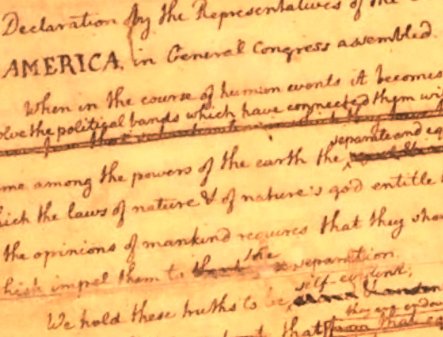It is a strange coincidence that just as the ship of the United States is groaning on the shoals of bankruptcy, leaking dollars like massive jets of seawater, at this precise moment a charismatic black American has risen out of relative obscurity in the lower decks to captain the ship.
But look! Are those phantoms I see, or real men, those masked Neo-Cons, dual-flag-lapel armchair warmongers, weapons and security services execs, rollicking banksters, all clambering overboard, their stern miens barely disguising their smirks, their pockets stuffed with loot, hoisting sail — but for what safe haven? Look again! Some of those tricksters are standing close by the bold new captain, up on the bridge, shouting commands — or is it advice? Ah, they're raising the rosy flag of Hope, "Change We Can Believe In," smacking the wind hard beneath the Stars and Stripes Forever.
What's going on?
Here in Vermont I voted for Barack Obama, not out of political conviction, but for many other reasons. Entangled by history, by family and friends, by a sense of justice and honor toward those fellow humans my Euro-American tribe first enslaved and then segregated as non-equals. Even if you are not an African American, but have friends who are, you know how deep, absolute, and complete a victory Barack Obama's election to the office of the U.S. presidency has been, an achievement unbounded by words, and unshakeable in the hearts of all African-American brothers and sisters.
There are other reasons I voted for our president. I am a lone secessionist in a large community of family and friends, almost all of whom (not quite all), starting with my own walk-beside, my own wife, do not share this peculiar dream of mine: to be free at last from the tyranny of what political scientist Sheldon Wollin calls "inverted totalitarianism" (aka "democracy in America"). To be free of the media lies daily flung in my face like spit, lies that extol violence and control as freedom and democracy. I long to be peaceably bounded in a small-scale polity, shorn of taxation for endless arrays of weaponry, ever-mounting war debts, insurance blackmail schemes for illnesses incurable and expanding, and free at last of my country's ceaseless chase after loot in all corners and every crevice of the globe. This is my dream. And Vermont seems a place where it could be realized.
And your dream? Is it like mine or like most other Vermonters', who "believe" and are stirred by the sight of that rosy flag of Hope & Change raised over their heads on January 20, 2009, as their ship of state was racing its huge turbo-charged engines to loosen itself from the hidden shoals it'd stuck itself on? The overwhelming majority of Vermonters are Americans first, firm believers in the humane possibilities of Big Government, its capacity to restore us, even now, to the nakedly materialist version of the American Dream. The version that in the wake of WW I was hatched by an out-of-work war propagandist and Big Business, and then unveiled bright and noble at the dawn of the Age of Advertising. That version of the American Dream now lies shopworn and bereft of purpose on the nation's doorsteps.
Americans first, true believers in the frozen-solid American Dream, elected President Ronald Reagan of Hollywood to rekindle "Morning in America." Still morning, still roseate inside the world's oldest democracy, more than two centuries' ripened. Ageless. Like a nation of Peter Pans we will not be responsible for our own inward growth. We will not grow up. Daddy can, and must, and will rise to the occasion. He will let us slide past the flaming post unsinged.
In the end we Americans have been burned. Now it's time to waken. Our dream has ended. It's time to make a new story to guide us forward.
Most of my family and my friends live elsewhere, outside Vermont, on the great North American landmass, even in the lands across the shining seas. For all their sakes, too, I pulled the lever for Obama. The unrelenting post-9-11 rollback of Constitutional guarantees of freedom seemed less likely to worsen under the captaincy of a youthful, hip black man than under a sclerotic old white guy shadowed by a wild-eyed, six-gun-toting gal who waited in the backroom for his untimely demise. After all, Michele is digging up the south lawn for a latter-day Victory Garden. Imagine Laura doing that? Or what's-her-name? No, you can't.
Theater? Maybe. Tell me then, what isn't theater right now? Theater is about belief, the willing suspension of belief in "reality," about opening yourself to the exploration of a new narrative.
Secession is the birth channel for that new narrative.
Thirty-five years ago, during the OPEC oil crisis, I read two little books that changed how I looked at the world and its possibilities. The Limits to Growth (1972) convinced me to leave my job and work for the new environmental organizations that were starting to do battle in the federal courts on behalf of the commons (lakes, wetlands, rivers, air, non-human species, and the like) that our lives depended on, but which the economists insisted were mere "externalities." (Not to worry: the free market, abetted by Aladdin's Lamp of Technology, will protect us.) Of course the economists, then and now the ritual-driven ruling priesthood, won the argument.
But in winning the argument, the econ priests have at long last lost the story, or wrought its premature end. The human population explosion, ecosystem degradation, species extinction, climate change, agricultural shortfalls, epidemics, peak oil, and exponential free-market debt-and-credit-driven bubble economics have combined their disparate forces to bring closure to the mega-project we call Western civilization (now fully globalized). Exponential growth has reached, as Malthus had more or less predicted two centuries ago, its end point: collapse. The growth story no longer has a future (see Charles Eisenstein on Reality Sandwich for further clarifications).
And the growth story and the story of America are inextricably mixed together — impossible to untangle. Ponder this.
The year after Limits was published, and roundly condemned by the hapless left as well as the fervid right, E. F. "Fritz" Schumacher's Small Is Beautiful came out. I was so impressed I travelled to London to meet the author. We became friends. Here was an economist who thought like a humanist; he understood the a priori necessity of metaphysics! Fritz asked the ultimate questions, questions pertaining to meaning, to the purpose of life, whose answers had to inform how economics should work in the real world. "…[B]y considering goods as more important than people and consumption as more important than creative activity [modern economics has been] shifting the emphasis from the worker to the product of work, that is, from the human to the sub-human, a surrender to the forces of evil" (p.53).
A surrender to the forces of evil: that is, to ideas, beliefs, notions. Evil resides not in a barren heart or an ignorant mind. Its way must be prepared. And so we in America have surrendered, bit by inexorable bit, aided and abetted by our media, our leaders, and our institutions of "higher" learning. Worse still, the world, at first a reluctant lover, has followed us straight into our cul de sac, our "dream."
But not all of us, and not all the world, have made that blind journey of faith.
When the Declaration of Independence was penned and signed by our forefathers in 1776, some 18,000 sovereign political bodies existed on earth, when almost 1 billion of us humans then lived. A mere 200 or so years later, with six almost seven times the number of human beings, that incredibly diverse panoply of sovereign bodies had been destroyed, largely by a few imperially driven nation states, and brutally crushed into less than 200 states – less than a mere dozen of which control, directly or indirectly, the lives of every human being on earth.
This trend toward massive centralization is, without doubt, the most notable thing about human society that has occurred in the last several hundred years.
Impelled by the story of Her Majesty's Empire, of the Union, of the Reich, of all the Motherlands and Fatherlands, and all the promises of a wide variety of demagogic leaders, humanity has left the diversity of the small for the uniformity of the big. The wars fought to attain this state of affairs have consumed lives as a raging fire consumes dry kindling. Their fatalities dwarf those of the earlier, pre-Napoleonic, pre-Civil-War eras, as towering mountains dwarf their misty foothills.
Schumacher (himself a student of Leopold Kohr, author of The Breakdown of Nations) taught me to think about scale, especially as it relates to the potential for the degradation or elevation of human beings. To what caused violence and what birthed peace. He set me on the path of being a decentralist. And in becoming a decentralist I unwittingly took my first fateful step toward becoming a secessionist.
Thirty years later, in 2003, a full two years and more since the empire's plan for war against Iraq and disaster capitalism for the whole of the Arab and Muslim world had been hatched in the fetid obscurity of the Vice President's Energy Task Force, I awoke to the full savagery of the times. Mute citizens were being gorged into stupefaction on Fox's and CNN's shock-and-awe spectacles and swallowing official lies that piled up in front of them like indigestible spaghetti with no discernible ends or beginnings. A presidential election had been stolen, the theft inscrutably sanctified by the unelected and unaccountable Third Branch, with no recourse available to the voting citizenry. A Nazi-nomenclature-inspired "Homeland Security Department" had mushroomed overnight into putrid life and fed like a band of bloated sewer rats on the nation's once solid moral foundations.
I was forced awake. I could no longer avoid knowing where and who I was, an American citizen whose taxes and personally-voted-for representatives were funding the terrors of Gitmo, Abu Gharib, Baghram, Diego Garcia — the whole vast despicable global gulag of extradition, rendition, and death, whose victims, innocent and not, were dumped, dead or half-alive, on the outskirts of the U.S.-led "Free World." Orwell's prophetic dystopia was being resurrected not in the Soviet empire, but in the American — O'Brien, the Inquisitor in Room 101, represented us, not "them" (1984, Part 3). Irony is a labored, whorish term for this piece of trickery.
I became despondent, enraged. Become an ex-patriot I whispered to myself. No sooner than the liberating thought lifted me, it plummeted me like a rock from a ledge. My mother, how could I leave her? Mother and the land seemed inextricable, identified or woven together as one in my heart. I did not think first of my children, but of my one living ancestor, my mother. My ancestors had been in America for almost 400 years, and fought in every war of consequence for the nation, beginning with the Revolutionary War. I remembered next my children, my grandchildren. My wife, my brothers, sisters-in-law, nieces and nephews. What of them?
Then a compassionate friend and neighbor, listening to me grieve and rant, invited me to attend a meeting of secessionists, but an hour's drive north.
Secessionists?
Lincoln's genocidal victory for the "eternally" [sic] indivisible union of all the states into one supreme nation state eradicated ancient norms and attitudes in the northern psyche. Especially in New England, where a mere generation earlier secession had been a palpable, actionable option, more than once almost acted out (e.g., the Hartford Convention). After 1865 the United States were no longer referred to in the plural. The right of secession, capstone of the residual 10th Amendment rights of the states now gathered involuntarily under the roof of one nation under one commander-in-chief, went underground. Its very naming underwent deep etymological tissue surgery; it vanished from the living body of discourse by which we disparate Americans weigh our present and futures as communities of free human beings.
As a northerner born and bred, I could not grasp the idea of secession at first. It didn't exist but floated insubstantial somewhere beyond my groping thought. Southerners have never forgotten this archaic American birthright. It sits like an undigested, heavy fruit inside their bellies. And at that March 2003 mud-season meeting I met the Second Vermont Republic movement's founder, Thomas Naylor, born and raised in Mississippi, and like me a liberal-minded transplant to Vermont. That late March day seated round a wood stove the candle of secession was unexpectedly lit inside me. I began my journey of rediscovery of a basic American right, planted smack in the heart of the Declaration of Independence, and more murkily in the Constitution's 10th Amendment.
The economic decentralist had arrived home, at last, arm-in-arm with the political secessionist. They were one and the same all along.
To be small scale requires small-scale sovereignty, or the ideas associated with small scale — accountability, transparency, familiarity, co-dependence and co-operation, mutual respect and toleration, self-reliance and independence — are but chimeras wholly dependent on the whim of an authority resident far outside the bounds of the community. They are mere "feel-good" ego boosters, substanceless. The transfer of state sovereignty to Washington is now virtually total: The U.S. president controls the Vermont militia (its "National" Guard) and can dispatch Guardsmen and women 8,000 or more miles east or west at his own discretion, with nary a murmur from an impotent governor. The state cannot even determine the age at which its citizens may drink, lest all funds for its highways be withdrawn. Nor resurrect an old and valuable crop like hemp, lest the USDA helicopters leap in, fully armed, as though our farmers were rightless peasants in a distant outpost of the empire. And so the state has become an abject, groveling castrate, eager to serve the whims of Washington for crumbs and good marks in the service of an empire from which it amorally presumes it benefits.
What then of the rascals' safe haven? The one for which the tricksters who have looted us believe they are setting sail? The shores to which these pirates have set sail will be ruled by a transnational oligopoly — a secretive cabal of bankers, merchants of death, security analysts, intelligence gatherers and enforcers, bureaucrats, and politicos — more formally organized into alliances and no longer sworn to the allegiance of any single hegemonic state. Of course the world does not surrender itself so easily to formulaic thought. One thinks immediately of the U.S. military, which costs its citizens more than all the other militaries of the world's states combined cost their citizens. To whom will it be answerable? Though the process of globalization of force may be ambiguous and messy, the trends have been unmistakable. Following the prescriptions of Zbigniew Brzezinski (The Grand Chessboard) the U.S. and NATO now ring Eurasia with military bases and missile sites strewn across many thousands of miles. NATO assists the U.S. in waging its and Europe's (and Japan's) imperial wars there. Who controls Eurasia, controls the world. Or so go the dreams of old men. (And maybe too of our young captain.)
Thus do the usual suspects — brandishing their Pavlovian shibboleths of "defense" and "national security," and the "war against terror," the globalized war against the peoples whose states just happen to control the lion's share of the sacred black gold — presume to rally us into loyal ranks inside their new regional alliances. But to achieve their new New World Order they must first humiliate the rancorous American people, believers in their own exceptionalist destiny, as well as their overweening federal government. This step is all but taken: the basis of American power is the supremacy of its currency, the dollar, in international trade. This supremacy was solidified at Bretton Woods (1944) and twenty-odd years later modified by Nixon and Kissinger as the petro dollar. That supremacy will end within months, at the latest toward the end of Obama's first term. The U.S., as Nouriel Roubini and other commentators have noted, is "effectively insolvent." Bankrupt. The exponentially growing debts of all Americans and their institutions are unpayable, and insure the dollar's demise as the exclusive or dominant currency for world trade. In effect a long-enjoyed tax levied by the American people upon the rest of the world will soon cease to exist.
Bankruptcy does terrible things to the arrogant and prideful.
Gathered on the darkening shores of the "safe haven" are legions of Neo-Keynesian White Knights and blood-soaked Friedmanite Black Knights. Do they array for battle, one against the other? I think not. Look, they gather at the dying vats and throw their costumes in, et voilá!, they re-anoint themselves, newly garbed in grey. Boldly seizing the laundered banner of their One True Paradigm, behold the priesthood form its ranks for its final defense of Capitalism.
They are a doomed company committed to a doomed paradigm. Like their slavish government clients they remain essentially clueless wandering their new "safe" shores, arrogantly betting on their tried-and-true armamentarium of Technology, Thought Control, and Monetary Hocus-Pocus. Their shock-and-awe stock-in-trade.
And so we now all depart for terra incognita. The Grey Priesthood and its monarchial clients will not succeed with their newly packaged schemes of capitalist totalitarianism, though they will continue to test their panoply of social-control technologies aimed at us — we the people. We who stand, still enthralled by bigness, by the miracle and promise of the Daddy security state, the house built by Hamilton, Lincoln, Wilson, FDR, and Reagan.
A house whose timbers now creak loud in a hungry wind.
It's true the new New World Order, the safe haven, with its reliance on an ever more centralized global system of regulation and enforcement, does not yet confront an organized and powerful human constraint, other than perhaps Chinese and Russian recalcitrance, and Islamic intransigence. It does, however, confront non-human constraints now too powerful for it to control. Unfortunately for these elites, but not necessarily for those of us who choose to align ourselves differently, the relentless build-up of several greenhouse gases will continue to unleash massive climate alterations that will raise inexorably the cost of global capital's staying in business. The need for vast infrastructural repairs, increased insurance and recapitalization, for more expensive oil, natural gas, and other strategic minerals and resources, for ever-greater security and military "preparedness," and for credit generally to support the nutritional, housing and health requirements of a still-exploding world population, all these costs will implode the governments that shoulder them. The growth model — a purely mental construct, however consequential — will collapse along with the political systems and unfortunately many of the natural systems that enabled it in the first place.
It is a mark of our character as a national people that peak oil was neither debated, nor discussed, nor even mentioned in our most recent presidential debates. Who have we become that the most fundamental facts of our lives cannot be openly talked about in public forums available to all citizens? A nation of Peter Pans.
Whatever the terminus of the current world deflationary spiral — and remember its depths have yet to be plumbed, as that accountant's nightmare called the global derivatives market exceeds world GDP by a factor of 10 or more — the cost of maintaining a Western standard of living is going to inexorably rise on a diminishing base of strategic resources and of eroded, formerly free sinks for its growing and globally dispersed pollution.
Whether it comes now, as many believe is occurring, or later (but before 2020), the Greatest Depression will not be a cushy time for any. It will nonetheless be an opportune time for secessionists. The heart of a secessionist is committed to the place where she lives, to the land or landscape where she enacts her daily life, be it a townscape, a cityscape, an agricultural setting, or a woodland habitat. Without cheap oil the thread of globalization will unravel the entire carpet of the American Dream (now exported to the whole world).
The world's dream must be redreamt.
The new dreaming will be "a fantastic time for artists, visionaries, mad scientists and seers to step forward and present a well-defined alternative" yes (Pinchbeck "The Intentional Economy" this site), but it will also be the work of local farmers, winter harvesters, bakers, cheese-makers, vintners, soil engineers, water conservationists, technologists, group process facilitators, researchers, legal and money counselors, energy systems geeks, inventors, carpenters, masons, volunteers for public service, seed savers, repair men and women (plumbers, electricians, etc.), cloud gazers, recyclers, ombudsmen-and-women, negotiators, puppeteers, actors, couriers, veterinarians, health-givers, masseurs and masseuses, singers, landscapists and permaculturists, fire and police people, knitters and seamstresses, psychotherapists, hunters, smiths and welders, among countless others. Their common denominator will be their commitment to living well locally, living fully and creatively, locally; to local self-sufficiency; to local sustainability. And finally, and willy-nilly so, to local sovereignty.
In the end they will have come round full circle to be what their ancestors in this once-great nation once were: secessionists.
Only this time the "revolution" will be won without a shot fired.
Ian Baldwin is a founder of the E.F. Schumacher Society (US), co-founder with his wife Margo of Chelsea Green Publishing Company, a co-founder of http://www.metahistory.org/ and http://www.futureprimitive.org/, and
a founder and contributing editor of Vermont Commons (http://www.vtcommons.org/). He lives in
Vermont, in a woodland habitat.
This article is based on an earlier piece published in the January 2009 issue of Vermont Commons.
Image courtesy of Creative Commons license.













